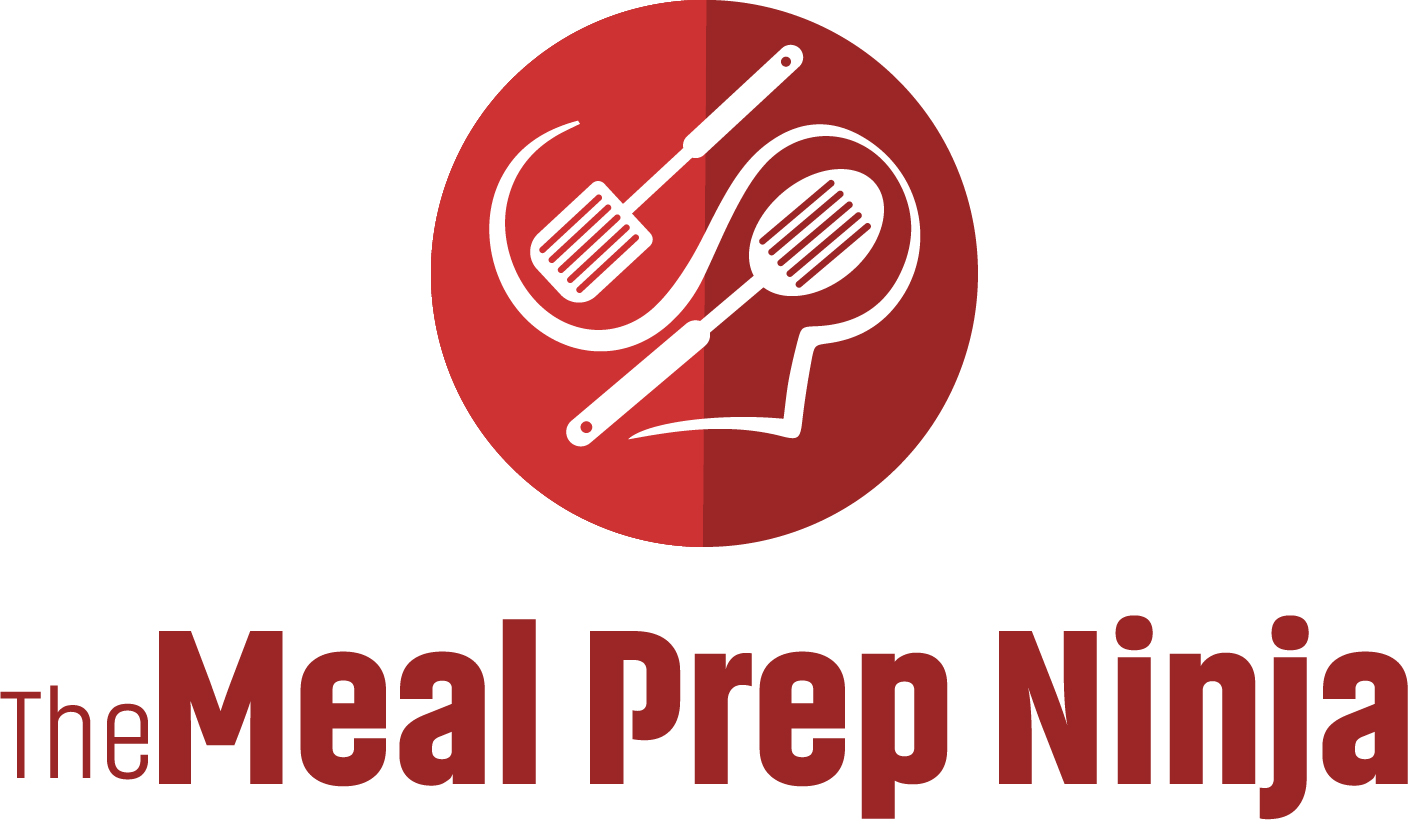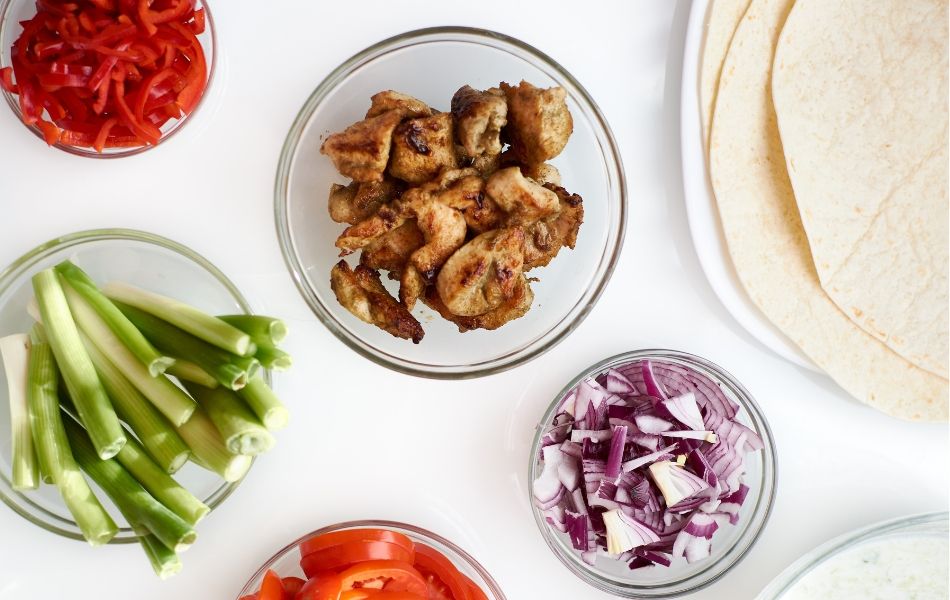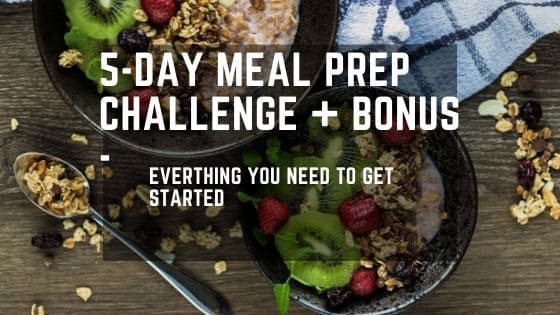Last Updated on December 4, 2020 by TheMealPrepNinja
Meal Prep for Weight Loss
Meal prep for weight loss is the art of preparing and planning all or some of your meals in advance to meet your fitness goals. This means cooking in batches, making your lunch the night before, or pre-cooking and portioning your food for the entire week in containers you can grab and go.
More Than Just A Trend
As a matter of fact, meal prep for weight loss is more than a food trend. It is a handy approach you can use to make homemade, delicious food that you will want to eat daily without having to wait. The end results look great but the truth is, meal preparations do not require complicated tools or planning. All you need is some elbow grease and time.
Adapts to fit you
The best part is that this way of meal preparation can be adjusted and adapted to fit your preferences and lifestyle because you are the boss. Meal prep for weight loss can be adapted to fit your particular personal diet, lifestyle or cooking expertise. It does not have to look worthy or Instagram or a beautifully plated Pinterest collage. It just needs to be available in advance. You only need determination and the commitment to actually begin your journey to fitness using meal prep for weight loss.
In fact, it is almost like creating your own line of tailored meals, microwaveable, and exactly what you had in mind. For busy mornings, having pre-packed breakfasts and lunches ready for you to grab and go to work with saves you time and thinking space. You can also opt to prep just all-breakfasts or all-lunches for the week ahead. It really is a make-your-own-rules kind of project.
The Benefits Of Meal Preparation
For those serious about goal-attainment, meal prep is considered to be the best method. There is no right and wrong or one size fits all method of preparing meals. It is a learning process meant to help simplify your lifestyle and routine. If you were able to create a set of pre-packed meals that are both nutritious and you save money and time in the process, that would be considered successful meal prepping. Here are a few more benefits of preparing your meals ahead of time.
1. Save Money
Meal preparations involve buying and budgeting for meals in advance. This means that you control portions as well as control costs. You will be saving more money because you won’t be ordering breakfast, lunch or dinner during the week. You can also choose recipes for your meal preparations based on the grocery store veggie or meat sales, for example. No matter what angle you look at it, meal preparation will save you money in the process even if this isn’t your primary goal.
2. Save Time
Meal preparations can save a lot of time when done properly. Whether you cook all your meals for the week on Sunday evening or pre-chop ingredients, when you get home at the end of each day, you won’t have to go to the grocery or even cook. This frees up time to enjoy a guilt-free bubble bath, spend quality time with the kids or work out at the gym.
3. Manage Hunger
When you prep meals in advance, you in effect manage your hunger since you will be able to eat the moment hunger strikes. Rather than going around time suddenly needing to find a source of food, all you need to do is to reach into your bag where you snack is packed. Plus, eating right when you feel hungry means you won’t overeat once you finally get food because you won’t be famished insanely.
4. Enjoy Complete Control
When you are planning what to eat in advance and cooking your own meals, you get to be in total control. You gain complete macro balance and calorie control and limit the uses of unwanted groceries like fat, salt and, sugar. You also ensure that you are getting the best options in terms of quality and the freshest ingredients since you are making your own selections and not relying on store-bought deli salads.
5. Remove Temptation
When your stomach starts to growl and there is nothing you can eat immediately, you tend to reach for the leftover cake your office mate brought to the office. When you prepare your meals ahead of time, this ensures that you will always have something to eat that you thought about in advance for when your hunger pangs strike. Planning in advance and bringing your own food will keep you on the path of your diet goals and being able to resist temptation. Meal preps also come in really handy when you watch tv and you need to mindlessly reach for a snack.
6. Stress Relief
Cutting calories and dieting cause many folks to think of food the entire day. Plus, when you are not in the mood for healthy choices or when you slip and stray from the diet, your willpower simply feels like it drains away. The stress of cutting calories and sticking to the plan is greatly relieved when you prep your meals in advance. You reduce the stress that comes with trying to eat healthier.
You free up your willpower when you solve all your food-related decisions in advance. You will lessen mental stress and thus, more easily and more rapidly reach your goals. Plus, it can be therapeutic to have a consistent Sunday evening or Sunday afternoon project of prepping your meals for the entire week. It is a great way to stay grounded and reach your weight and financial goals at the same time.
7. Cut Down On Food Waste
Once you have established a routine for your prepped meals, you will know how much ingredients you will need and cut down on food waste in the process. You will never have to witness withering veggies and fruits in the crisper drawer because you ordered a salad from takeout or overestimated your fresh fruit needs.
How To Meal Prep For Weight Loss
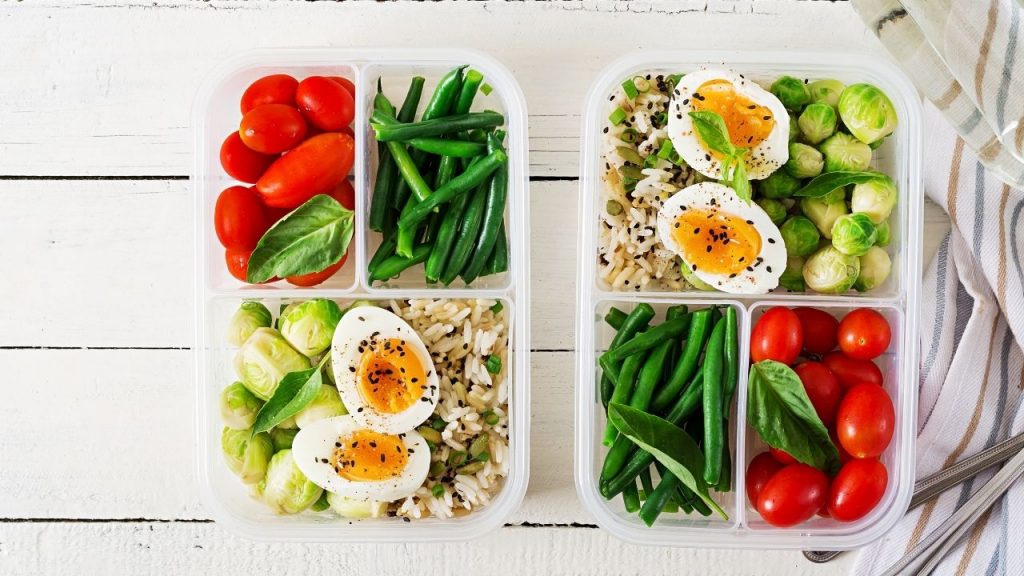
1. Schedule Time For Meal Prep
You will need time to prepare all the meals you plan to eat for the week. Schedule a specific day such as Sunday lunch or evening to cook all your meals and fill up all your food containers. Multitask by using your oven, pressure cooker, stovetop and microwave to heat, bake or cook many different recipes all at the same time. You will cut down on even more time when you learn how to multi-task with ease.
Fill up your containers and label them Breakfast, Lunch, Dinner or Snacks. Arrange them in your chiller or refrigerator and stack them by type. Thus, if you are preparing meals for the entire week, you should have seven containers stacked for breakfast, seven for lunch, seven for dinner and seven for snacks, all stacked vertically and labeled correctly. You might even want to go the extra mile and purchase disposable wooden spoons and forks and tape a set for each container.
2. Get High-Quality Food Storage Containers
Keep meal prep cold or hot with quality containers for food storage. Stainless steel or thermal containers are ideal for keeping food chilled or warm. Plus, these come in various sizes. you can warm them in boiling water or refrigerate them ahead of time before you add in the hot or cold food to make the food last longer. The safest solution is glassware as long as you can handle the containers with care. We use BPA free plastic containers most of the time. For some reason, I tend to lose a lot of my containers so plastic containers make more sense.
3. Build Your Menu
Decide which days of the week you want meals prepared and which meal, specifically. Find some simple recipes you can use for the entire week. List down what you will need for the recipes as well as the spices that come with it. Make a grocery list according to the ingredients that you need.
4. Avoid Boredom
You can save a lot of time when you prepare the same meal for every day of the week. However, this can also become unpredictable and boring, particularly for folks that love variety. If this sounds like you, then it might be a good idea to make small meal prep tweaks in garnishes, sauces, and veggies to keep things interesting.
You can also prepare and freeze many recipes in advance. Thaw a couple of containers in the fridge each day so you can enjoy a variety of dishes each week. I like to freeze soups and slow cooker recipes and have them on hand when I am running low on food or for dinner.
5. Keep Your Food Fresh
There are no hard rules for how to keep food extremely fresh. Basically, having a refrigerator that works well, correctly packing your food into each container and ingredient quality will all help in keeping your food fresh. Learn how to store food in the freezer and fridge according to the guidelines of the FDA. Find out what temperature is ideal to keep your refrigerator at. Containers that are divided will avoid flavor contamination.
Dry food needs to be packed separately from wet food like sauces and soups. Cold dishes can remain cold on the go when you use ice packs. Hot food remains warm when you use insulated pre-warmed containers. Before you cook and pack each container, make sure you are using food-safety gloves or wash your hands thoroughly. Meals that have been prepared beforehand tend to last between three and five days in the refrigerator.
If you are doing an entire week’s preparation, schedule meal prepping twice, once on Sunday and another meal prep day on Wednesday. This will almost guarantee total food freshness.
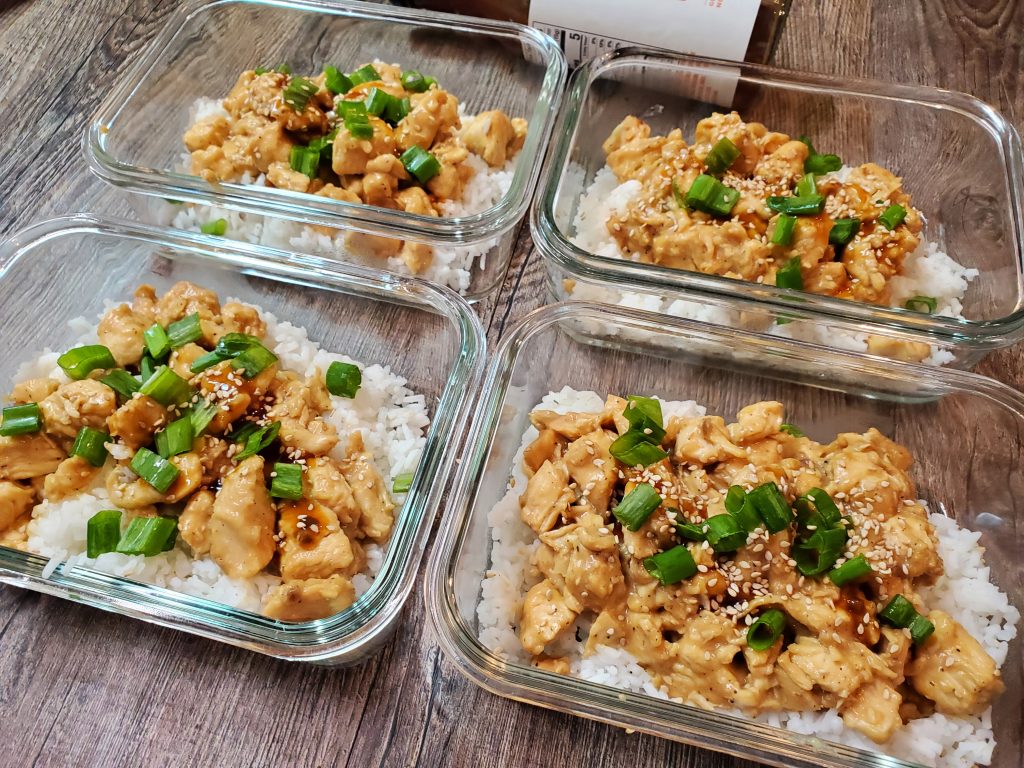
Meal Prep For Weight Loss
Meal Prep is the secret to sustainable and long term weight loss
In the fitness world, meal-preparation is the nutrition go-to. With meal preps, pounds are kept off and diets are kept on point, all while saving money and time. As a matter of fact, preparing meals ahead of time can be one of the biggest factors in helping you meet your fitness goals and lose weight.
When meal prepping for weight loss, learning how to do this like a boss does not have to be complicated. You can tailor your approach and meal plans according to your level of skills.
No culinary diplomas needed. This is one of the reasons I create YouTube videos to show you how simple meal prepping can be. Just like your meal prep, your diet is personal and what works for you is what works for you, even if it isn’t for everybody. Preparing food along won’t help automatically drop off those extra pounds if you are not following the basic weight loss steps.
Here are the steps to actually meal prep for weight loss:
1. Calculate how much weight you need to lose.
2. Calculate the maximum number of calories or macros you can eat daily. You can go to bmi-calculator.net to figure out your BMI and BMR. This is how I was about to calculate how many calories and macros I should be eating daily to be in a caloric deficit.
3. Find a list of food and the macros or calories they have and create meals accordingly. When I meal prep a recipe I add up all of the calories and macros in the entire recipe and then divide that by how many servings I create with that recipe.
Tips On How To Meal Prep for Weight Loss
Now that you have all the basic lists of food and their corresponding portions, macros, and calories, it is time to put everything into action. Macros and calories go hand in hand so when you are on a macro diet, meal prepping can keep your portions in check and help you stay within your maximum caloric intake better.
This is especially true when counting macros means you know how much of each food type you need to be eating. Buy a food scale or download an app that helps you track everything. Be precise, stay within the limits and learn portion control to match your goals.
Depending on your health and fitness goals, the portions you use can change from one meal to another. Adjust protein and carb portions depending on your workouts. Eat more food when you are active and less when you have a rest day and not moving quite as much.
1. Watch Those Carbs
Generally, when you are not on a keto diet, carbs need to be related directly to how much you move per day. Eat more carbs when you are more active and vice versa. Load up on veggies to provide you with high nutrient amounts and keep your metabolism stable and strong. Don’t avoid carbohydrates but just understand that it is better to load up on veggies then high processed bread and pasta.
2. Create Low Sugar Meals
Added ingredients like high sugar dressing, heavy sauce, cheese, and salt should be minimized. These pile-up calories quickly like fat and sugar. For variety and more flavor, add calorie-free additions such as chili flakes, paprika, fresh herbs, and lemon.
You can also use lighter options such as sugar-free dressings, nutritional yeast, kimchi or salsa.
3. Use Healthy Fat
Use avocado oil or olive oil as well as other healthy fat to cook with. You can also top your food with avocados, and olives which contain whole fats. Keep portions small and add these just for flavor. I like to use Olive Oil Spray instead of olive oil to keep the calories down.
4. Choose Your Meal Foundations Carefully
Your base can be whole grain pasta, brown rice, quinoa, and other whole grains. I like to use Protein pasta and cauliflower rice as a base for my recipes as well.
These selections travel well and make excellent food pairs to just about any flavor, veggie or protein that you have. Use potatoes, corn, peas, lentils, and beans. Keep portions with starch about one-third of each meal.
5. Don’t Forget Lean Protein
Lean protein such as tofu, grass-fed beef, fish and chicken balance our your meals. Lessen fried and breaded versions to help save on calories. Support lean muscle and stay satisfied by eating more protein.
6. Commitment Is Key
Commitment is key when it comes to adding meal preps to your already busy lifestyle. Commitment requires willpower to keep your eye on the prize and accomplish all your lifestyle goals. Willpower is something you either have or don’t have at the moment. Every time you make a decision, willpower is the energy that gets depleted. But over time your daily habits will take over and you will need less willpower to continue to stay on track.
So the goal is to meal prep long enough so that it becomes a daily habit and you no longer have to think about it. You will know what you need to eat and when to eat it.
Conclusion
When you meal prep for weight loss, your willpower to stop grazing but yet you need to eat, to fuel willpower. This is the reason why prepping meals beforehand is your weapon for successful weight loss.
When you create breakfasts, lunches, dinners, and snacks in batches ahead of time, you deal with not having to decide about what to eat the entire week, and you also don’t have to decide how much. It saves on willpower depletion which in turn, saves you from snacking.
You hit so many birds with one stone when you meal prep for weight loss. Not only does meal prepping save time, money and energy looking for a sugar boost when you need one, it is also a way for folks with busy lifestyles to meet yet another goal.
When you have healthy snacks and meals where you can reach them easily, you can continue busy and hectic lifestyles and yet still have nutritious food that helps you accomplish wellness and fitness goals at the same time.
These meal prep tips and tricks have helped my family and I stay on track with a busy lifestyle.
Jim Lopez, the founder and editor of The Meal Prep Ninja, shares his journey from a passionate bodybuilder and fitness enthusiast to a certified nutrition coach. Certified by Precision Nutrition, Jim aims to empower others with knowledge on meal prep and nutrition, offering resources for busy individuals to enjoy low-calorie, tasty foods. His blog is a community for sharing healthy eating habits and meal prep recipes
